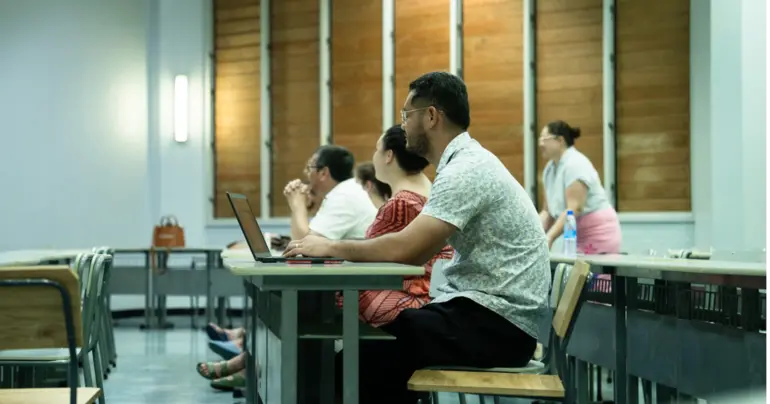Pacific Aviation Ministers launch regional strategy
 By Alexander Rheeney
•
30 September 2022, 12:00PM
By Alexander Rheeney
•
30 September 2022, 12:00PM
Pacific Aviation Ministers launched the ground-breaking 10-year Pacific Regional Aviation Strategy at the International Civil Aviation Organization (ICAO) 41st Assembly in Montréal, Canada.
The Pacific Regional Aviation Strategy 2022-2032 provides for a regional vision for a harmonised, collaborative, and connected Pacific aviation system that supports safe, secure, and sustainable aviation in all Pacific Island States.
On behalf of 18 Pacific Island States, the strategy was officially launched by the PNG Minister for Transport and Civil Aviation, Walter Schnaubelt at a special ceremony with the ICAO Secretary General Juan Carlos Salazar at ICAO’s tri-annual meeting.
The Pacific Island States represented by the strategy includes Australia, Cook Islands, Federated States of Micronesia, Fiji, French Polynesia, Kiribati, Nauru, New Caledonia, New Zealand, Niue, Palau, Papua New Guinea, Republic of Marshall Islands, Samoa, Solomon Islands, Tuvalu, Tonga, and Vanuatu.
Samoa's Minister of Works Transport and Infrastructure, Olo Fiti Vaai attend the conference in Canada on behalf of the Samoa Government.
The PNG Minister of Transport and Civil Aviation, Walter Schnaubelt, highlighted the significance of the launching of the regional strategy in a statement released by the Pacific Aviation Safety Office (PASO).
“This important aviation strategy for the Pacific is designed to present a clear pathway for achieving a strengthened pacific aviation system and community going into the future,” Mr. Schnaubelt said.
The new Pacific strategy signals the regions’ strong commitment to improving aviation systems and achieving international safety and security compliance via collaboration, coordination, and harmonisation.
The ten-year strategy is a ‘living document’ and aligns with the overarching 2050 Strategy for the Blue Pacific Continent, which acknowledges that aviation connectivity is an essential driver of economic growth, jobs, trade, and mobility for Pacific Island States.
The critical challenges facing aviation globally are recognised in the strategy, which seeks to deliver a safe, secure air transport system, protect the environment, and support sustainable economic development of Pacific States.

Specifically, the strategy tackles the priorities of regional cooperation and engagement, aviation capability development, sustainable economic development, pandemic recovery and resilience, environmental protection, aviation safety and security, and harmonised regulatory systems.
“As a small region, the Pacific faces a range of development challenges, is vulnerable to climate change and disasters and various limitation in terms of capacity and equipment constraints,” said Mr. Schnaubelt.
These development challenges and constraints have had a severe impact on the Pacific region in terms of ICAO Effective Implementation (EI) scores as outlined in ICAO’s Pacific Small Islands Developing States (PSIDS) aviation needs analysis.
The ICAO Secretary General Juan Carlos Salazar described the new strategy as “a major turning point” for the Pacific region at the special launch of the ICAO 41st Assembly ceremony and emphasised ICAO’s ongoing commitment and active engagement with Pacific Island States for sustainable civil aviation growth in the Pacific.
“I wish to emphasize ICAO’s unwavering commitment towards the Pacific Small Islands Developing States (PSIDS) to facilitate safe, secure, efficient and sustainable international aviation, and invite Member States to continue their support, so that we can advance the achievement of the ICAO Strategic Objectives in the Pacific, and worldwide,” said Secretary General Salazar.
Key outcomes of the Regional Aviation Ministers Meeting (RAMM1) in June 2021 were the Port Moresby Declaration on Aviation Safety and Security and ministerial agreement to develop the 10-year Pacific Regional Aviation Strategy to guide the long-term delivery of aviation for the Pacific region.
“The Port Moresby Declaration is a call to action by our Pacific Island State Leaders to uplift the aviation services and systems in the region while elevating aviation’s profile to its rightful place as one of the main drivers of economic prosperity,” said Mr. Schnaubelt.
As the RAMM Secretariat, the Pacific Aviation Safety Office (PASO) worked with key partners to develop the strategy with the guidance of Pacific States with funding from the World Bank.
The strategy was in-principally endorsed by Pacific Aviation Ministers at the second Regional Aviation Ministers Meeting (RAMM2) in June 2022.
PASO will develop an implementation plan for the initial phase of the strategy with direction from the region’s aviation officials for presentation at the RAMM3 in 2023.
 By Alexander Rheeney
•
30 September 2022, 12:00PM
By Alexander Rheeney
•
30 September 2022, 12:00PM











